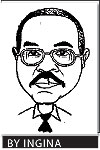Last Tuesday I got a belly-laugh out of a friend’s musings that I was reading. He was decrying the conduct of a fraudulent Rwandan who is trotting the globe, passing himself off as a hero. Which found sympathy in my heart, because the conman has indeed brought shame to all his country folk and should be condemned by all who cherish their honour. The object of scrutiny for my friend, however, was not the source of my mirth. The heredity of my friend was.


Last Tuesday I got a belly-laugh out of a friend’s musings that I was reading. He was decrying the conduct of a fraudulent Rwandan who is trotting the globe, passing himself off as a hero.
Which found sympathy in my heart, because the conman has indeed brought shame to all his country folk and should be condemned by all who cherish their honour. The object of scrutiny for my friend, however, was not the source of my mirth. The heredity of my friend was.
My friend is of the extraction of a clan whose members are known to be so jittery of any sign of belligerence as to feign haemorrhoids. Now, unbeknownst to my friend, I assume, there is an individual in town who is overlord of that clan – and sundry others in the region and beyond – whose little secret might be coming in the open. Persistent rumour has it that if it truly is, it might set off a tsunami in the face of which the recent Japanese tsunami becomes a mere ripple. The rumour is that the overlord is claiming the name of the formidable Bitibibisi!
Granted, all are in agreement that that overlord may be the genuine honcho of the clan. After all, among the blind (not to mention the not-so-brave, with nary an eye as an exception!), a one-eyed man may be king. But it is one thing to claim to be king of the not-so-brave and a totally different other to appropriate to yourself the name of a mighty warrior. Apart from running the risk of annoying someone in the progeny of that warrior, there is the more frightening risk of attracting the attention of the kahuna of the fierce warrior clan of the chilly slopes of Mount Muhabura. As legend is witness, Terror is the first name for that clan.
But before that ‘honcho’ scurries to hide in some nook (maybe under his bed!), I hope he gets to know the powerful warrior he dares compare himself to.
Bitibibisi lived in Musaho of Rubengera, in Bwishaza (in today’s Karongi District, south Western Rwanda) in the early 16th Century. He was the head warrior of the great King Ndahiro who was killed at battle. Upon Ndahiro’s death, Rwanda was plunged into division and darkness, and many of his vassals tore up the monarchy into pieces and reigned over them. Bitibibisi also fell prey to that temptation and took over Bwishaza.
His reign proved to be short-lived, however, as King Ndahiro’s successor to the throne emerged from Karagwe (in today’s northern Tanzania), where he’d been taken as a teenager for his security and to grow into maturity. The successor was Ruganzu, Ndahiro’s son, who also grew up to become a great warrior, as King Ruganzu Ndoli. From Tanzania, he conquered all the regions of the north and consolidated Eastern, Northern and Central Rwanda.
Then he bore down on the powerful kingdom of the dreaded queen of the south, known as Nyagakecuru of Bisi bya Huye. The battle was bitter, but in the end Ruganzu overran the kingdom. With the eastern, northern, central and southern regions consolidated, now what remained were the kinglets of the western region so that he could re-unite Rwanda. From Butare, Ruganzu overran the kinglets on his way and settled in Kinyaga and Rusenyi, whose king, Mukire, he befriended as he had a strong body of warriors.
Ruganzu had to devise a clever ruse of how to take Mukire’s kingdom, so he convinced him that he could not be awakened when he slept except by the sharp edge of an axe. He ended up finishing off Mukire with that axe but that is a long story for another day. Ruganzu was going for the kingdom of Bitibibisi, the erstwhile great warrior of his late father. The battle was even bloodier than that against Nyagakecuru, and the death toll was high. On the fourth day, however, Ruganzu’s warriors overrun Bitibibisi’s kingdom, Bwishaza, and burnt down his palace.
But Bitibibisi had not been captured. He was hiding in the shrubs of the shores of Lake Kivu, with his bow and arrow. When, unaware of Bitibibisi’s whereabouts, Ruganzu made the mistake of exposing himself for a split-second, even at that long distance, Bitibibisi carefully aimed and picked him out with an arrow in the right eye that went through the left back of the neck. Ibisumizi, Ruganzu’s warriors, ran to his rescue but, however hard they tried, they could not extricate the arrow from their king’s neck and eye.
They rushed to metal forgers of the area, but by the time they removed the arrow King Ruganzu Ndoli was fallen. Ibisumizi immediately went for Bitibibisi and caught up with him in Lake Kivu and vanquished him. But he had killed King Ruganzu Ndoli, one of our truly great heroes who have been able to reunite Rwanda against all odds.
Still, we can’t but acknowledge the great fighting spirit and valour of this Bitibibisi, too.
So my friend wonders at the impudence of that impostor savour. Indeed, quacks are a dime a dozen and maybe my friend should also remember to draft his own sham warrior-king (daring to call himself Bitibibisi?) on that long list of dishonour!
E-mail: iyigihanga@gmail.com
Blog: iyigihanga.wordpress.com


